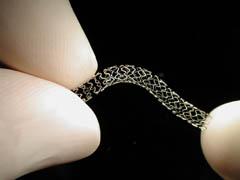
December 6, 2010 – A new stent shows favorable outcomes compared to bare metal stents (BMS) for treating coronary artery bifurcation lesions. Data for the Genous Stent, from OrbusNeich, was published online in the journal, Atherosclerosis.
The study's primary endpoint, the composite of cardiac death, myocardial infarction (MI) or target lesion revascularization (TLR) at one year, was 12.4 percent in patients treated with a Genous Stent, compared to 17.2 percent for the control group treated with BMS. The definite or probable stent thrombosis (ST) rate was 1.7 percent for the Genous Stent patient group, compared to 3.4 percent for the BMS treated patient group.
"Interventional cardiologists continue to be challenged by the 15 to 20 percent of all percutaneous coronary interventions that involve coronary artery bifurcation lesions," said Marcel Beijk, M.D., of the Academic Medical Center in Amsterdam, the lead author of the paper. "The results of this large study of provisional T-stenting using the Genous Stent are extremely encouraging. The endothelial progenitor cell capture stent provides an excellent alternative to bare metal stents for the treatment of these challenging lesions."
The paper is based on a single-center, non-randomized study. The study involved 178 patients who underwent percutaneous coronary intervention for a de novo bifurcation lesion treated with a Genous Stent and 465 consecutive patients treated with BMS.
The Genous Stent uses the company’s endothelial progenitor cell (EPC) capture technology that promotes the accelerated natural healing of the vessel wall after stent implantation. An antibody surface coating attracts EPCs circulating in the blood to the device to form an endothelial layer that provides protection against thrombosis and modulates restenosis.
For more information: www.OrbusNeich.com


 January 05, 2026
January 05, 2026 









